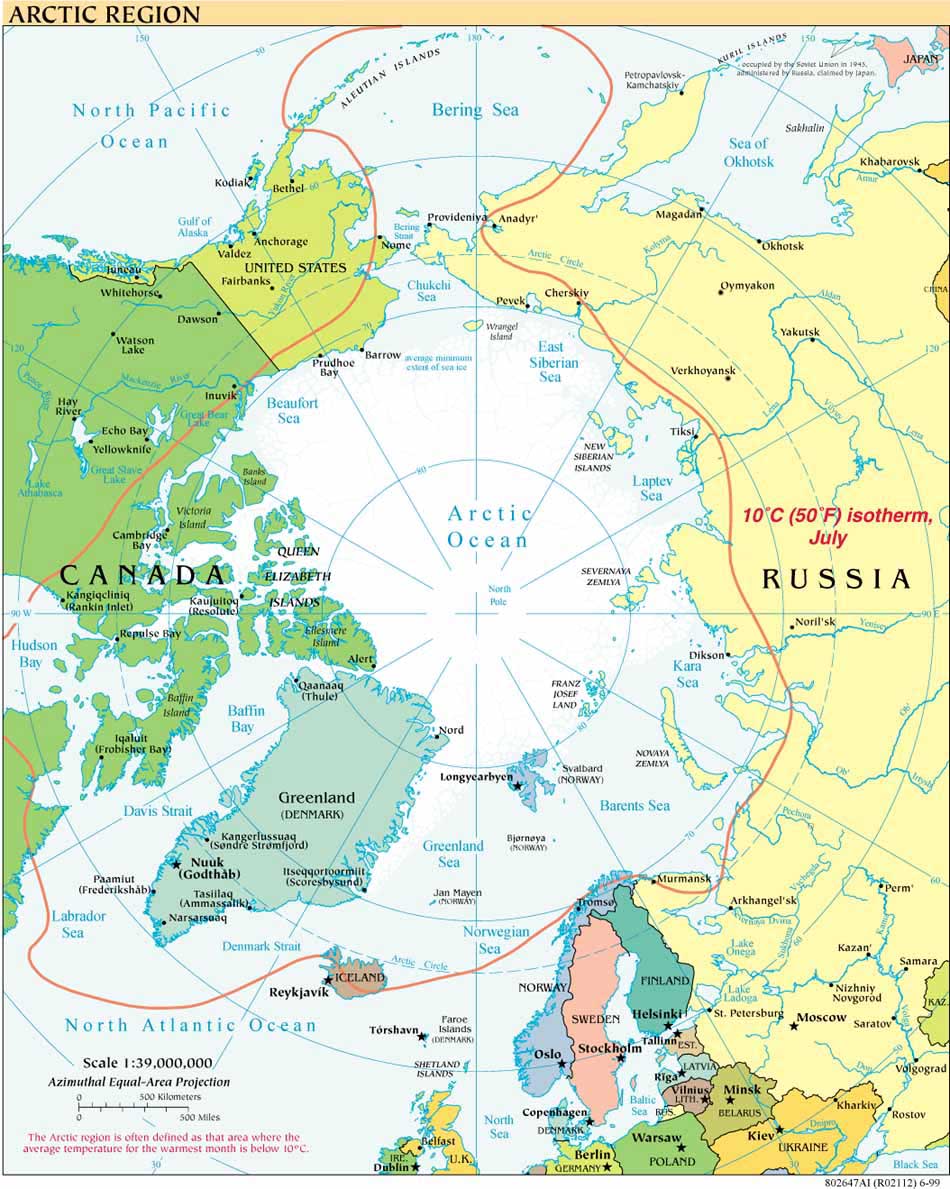Regular readers of this blog are familiar with the arguments for U.S. accession to the Law of the Sea Convention (simply look to the upper right corner of this page for a partial listing of support). They are likely also familiar with the misinformation that opponents have spread about the Convention. A conservative think tank, the Institute for Liberty, has done its own research and changed its mind, arguing forcefully for U.S. accession before the end of 2012. The institute launched an initiative in August 2012 to promote accession and yesterday its President, Andrew Langer,published a lengthy piece in Real Clear Politics debunking the opposition myths.
Regular readers also know this blogger's mantra that cooperation, not conflict, rules the day in the Arctic (for a recent piece to that effect see OGEL's special 2012 issue on the Arctic). While Langer sees a "new Cold War" in the Arctic, he overlooks the fact that Russia is following the same rules and procedures to delineate the extent of its shelf that the Convention prescribes for all states. Notwithstanding this blogger's disagreement on that point, the article is worth a full read, especially for its point-by-point responses to the "disinformation" spread by the Convention's opponents. Thanks to Caitlyn Antrim for drawing attention to the piece, which is excerpted below from http://www.realclearpolitics.com/articles/2012/11/28/the_case_for_ratification_of_the_law_of_the_sea_treaty_116272-full.html
Another short excerpt gives a taste of how the piece debunks false arguments against the Law of the Sea Convention:
[Langer continues:]
For the full article, go to Real Clear Politics.
Regular readers also know this blogger's mantra that cooperation, not conflict, rules the day in the Arctic (for a recent piece to that effect see OGEL's special 2012 issue on the Arctic). While Langer sees a "new Cold War" in the Arctic, he overlooks the fact that Russia is following the same rules and procedures to delineate the extent of its shelf that the Convention prescribes for all states. Notwithstanding this blogger's disagreement on that point, the article is worth a full read, especially for its point-by-point responses to the "disinformation" spread by the Convention's opponents. Thanks to Caitlyn Antrim for drawing attention to the piece, which is excerpted below from http://www.realclearpolitics.com/articles/2012/11/28/the_case_for_ratification_of_the_law_of_the_sea_treaty_116272-full.html
"The Case for Ratification of the Law of the Sea Treaty" [EXCERPTS]By Andrew Langer - November 28, 2012"The Stakes Have Rarely Been Higher"The Institute for Liberty (IFL) has come to the conclusion that ratifying the Law of the Sea Treaty is the most important property rights and wealth building step that America can take to maintain our leading superpower status and to exponentially grow our economy.There has been a tremendous amount of disinformation about this treaty. In fact, just earlier this year, IFL thought we knew the truth about what was termed “LOST” and we signed a letter opposing ratification. We, like so many other conservatives, were given bad information.In light of the facts, IFL dropped our opposition to the treaty and we are now leading the conservative charge for its ratification. I am meeting everyday with conservative grassroots leaders to ask them to join me in this imperative course correction and we are making a great deal of progress."
Another short excerpt gives a taste of how the piece debunks false arguments against the Law of the Sea Convention:
[Langer continues:]
"Myth: Ronald Reagan wouldn’t ratify this treaty.Fact: Ronald Reagan’s Chief of Staff James Baker III supports the treaty’s ratification and he says that this version of the Law of the Sea Treaty is the version that Reagan fought for himself. Baker says that Reagan fought for the mineral rights contained in the treaty and that the mineral rights section is where Reagan’s objects rested – Reagan did not see “backdoor tax” or “sovereignty” boogiemen in LOTS or in the ISA. Hear from Baker yourself. In this video you can watch him talk directly about Ronald Reagan and Law of the Sea Treaty during his remarks of August 26, 2012 (between the time marker 35:29 – 36:32)Myth: This treaty is an environmentalist ploy.Fact: False. This treaty is backed by the US military; by the mining, oil and gas industries; by manufacturers; by the defense industry; and, by every living Republican Secretary of State and by every Republican president – essentially, this treaty is backed by everyone the environmentalist community loathes, sues and pickets. The supporters of this treaty are amongst the most vocal critics of so-called “global warming” and have fought the Kyoto Protocol tooth and nail. This treaty is about trillions of dollars of US wealth creation, hundreds of thousands of American jobs, and about the national security benefits that arise from the 100% veto power the U.S. gains over all other nations via ratification.Myth: U.S. companies can explore mineral claims without ratifying the treaty and joining the ISA.Fact: False. This is the issue of property rights, which is of tantamount importance in forging political stability and global prosperity. Right now, U.S. business’ mineral claims are imperiled because of our inability to participate in the International Seabed Authority. If other nations can lay claim to these regions, and have the lawful backing of the treaty and the ISA, then our businesses can legally be forced off these claims. U.S. businesses cannot subject themselves to a potential taking scenario where once that have developed a resource, it is taken by China or Russia."
For the full article, go to Real Clear Politics.


